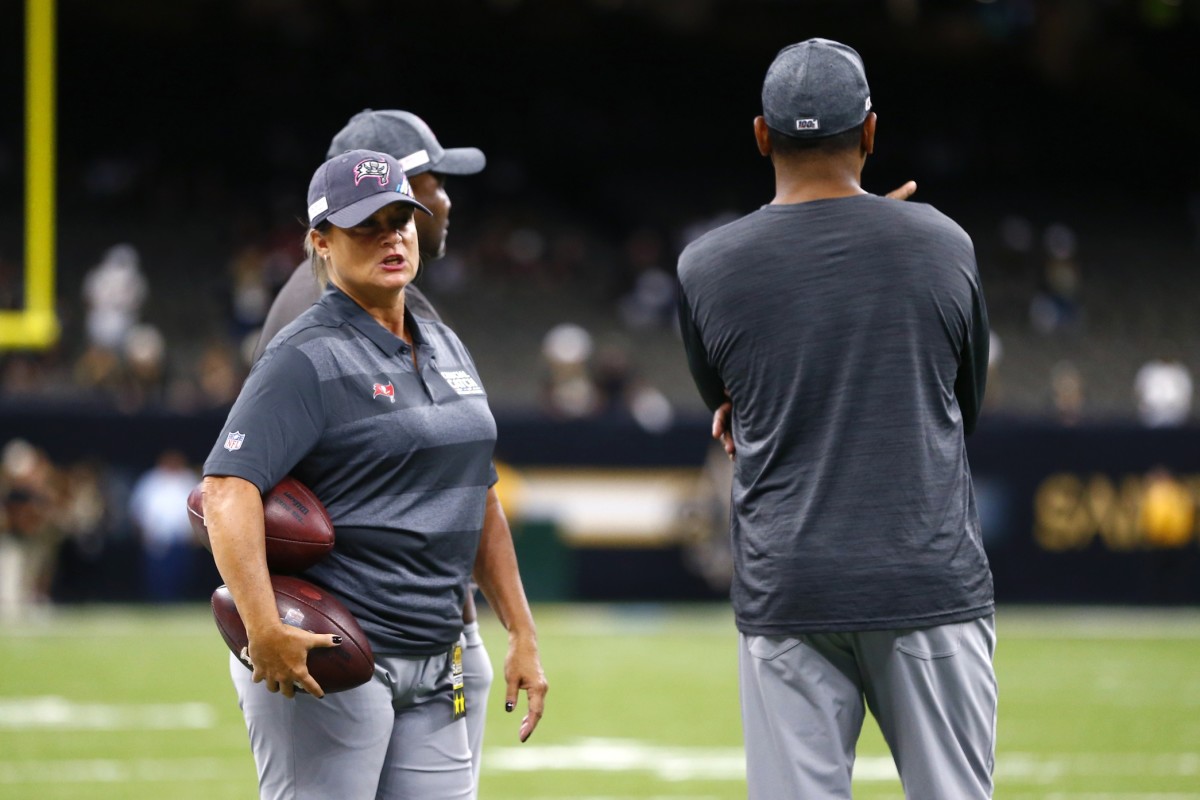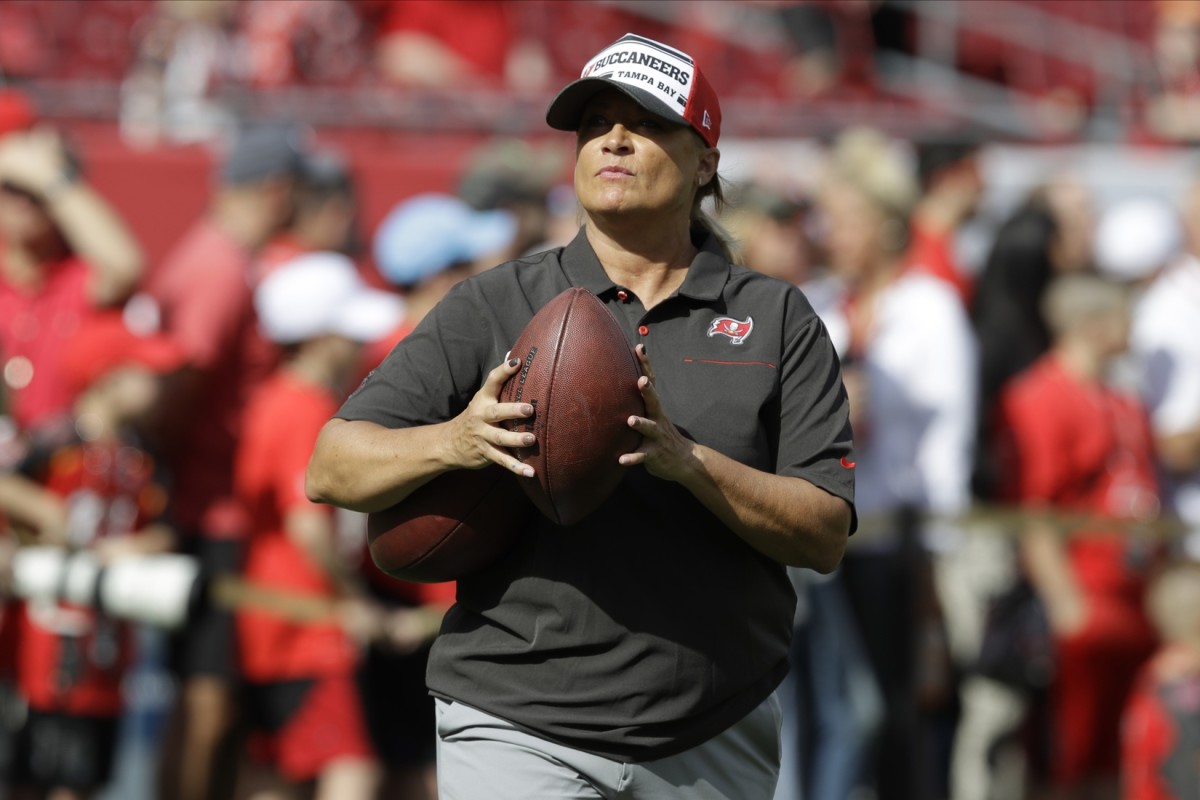Lori Locust Paving the Way for Next Generation of Women in NFL Coaching
For Lori Locust, the path to becoming an NFL coach didn’t just happen overnight. She was able to turn her love for the game into a coaching career in her 50s, an accomplishment not many people can boast.
Prior to becoming the assistant defensive line coach for the Tampa Bay Buccaneers, Locust worked in the insurance industry for over 20 years. She’s also a mom of two sons. She would try her best to balance it all the best she could.
She knew she always loved the game of football, and finally got a chance to play right before she turned 40, when a women’s team came to Harrisburg, Pennsylvania. After suffering a pretty brutal injury to her knee, Locust decided to pick up coaching as a way to stay close to the game. This ignited a fire in her, and one step led to the next.
Throughout her coaching career, Locust would often come across a lot of opportunities, but none were monetarily beneficial. She never really got paid to coach. High schools didn’t have the financial resources to pay their coaches, but late nights and meetings were still part of the gig. Locust fully understood that the work she was putting in benefited the team, and was also an investment in herself long term. Locust felt these coaching opportunities gave her a better mentality and allowed her to be around good coaches that she could learn from.

Money was tight for a while. Traveling and attending football seminars got expensive. Like most working moms, Locust’s main focus was her family, so she never wanted her goals to take away from the activities her sons were involved in. She continued to shadow and attend coaching seminars whenever she could. Sometimes, this required sleeping in her car if the money wasn’t there.
“People would see that I was putting effort in," Locust says. "The guys would always look out for me. Sometimes an extra meal voucher would find its way over. I did all of this because I thought it would be best long term.”
Locust was invited to Dartmouth for Pro Day, but wasn’t able to attend. Months later, after losing her job, she was invited back to shadow.
“A former player just called me to touch base, and I told him I was debating on whether or not to go to Dartmouth, because it was a lot of money that I just didn’t have," Locust recalls. "He said, 'Do you remember when you put $20 in my hand?' After we got off the phone, he ended up sending $100 to my Venmo account and because of that, I was able to go shadow at Dartmouth. Situations like this are what told me to keep going.”
After years of building her coaching resume, Locust took an internship with the Baltimore Ravens. When she got back, she hit a fork in the road. That pivotal moment in everyone’s life where you get pushed out of your comfort zone. She lost her job, and the bills kept coming. She had the choice to either fully commit to coaching, or go back into the workforce.

The timing was right, and with her kids now a little older, the possibility for her to make this next step was there. Now was the time, so Locust started to reach out to allies whom she had met along the way.
“There’s a process of time and effort to get to the next level," Locust says. "You can’t just skip steps. If I hadn’t started to really focus, I could’ve just been comfortable in the career path I was on.”
After thirteen years of coaching, she joined the Birmingham Iron as a defensive line coach in the newly formed Alliance of American Football, a professional spring league.
“Working in the AAF gave me a sense for how regimented the schedule is, and the importance of staying organized," Locust says.
After getting experience in the AAF, she was hired on full-time by Bucs head coach Bruce Arians.
With her first season as a Bucs coach under her belt, Locust is looking forward to taking on more responsibilities with the team. Last year, her main focus was learning the schemes so that she could comfortably teach it at the same pace and response time as everyone else. Technicality is an important part of her coaching style.
Following this year’s NFL Draft, Locust had the rookies on her own for the majority of their training. Working with defensive line coach Kacey Rodgers has taught her the day-to-day tasks, how to absorb the information and operate comfortably as a coach. Locust said that in her first year there was a learning curve, but now Rodgers will be pulling back and letting her take on more.

When asked about her coaching style and which coaches she pulled inspiration from, Locust says she was drawn to “fiery, old-school coaches” in the beginning. Someone like Herm Edwards. She also appreciates Tony Dungy’s style of coaching, and his technical knowledge of the game. Above all, authenticity is most important to her. She is looking to provide a balance of both.
“I want my technical knowledge to be on par with my colleagues," Locust says. "I’ve grown a lot as a coach. I pump the players up if they need it, but I try to just be consistent with everything. They know it’s all about their play, nothing personal. Excellence is the goal.”
Locust sits on the Advisory Board of the Women’s Football Alliance, along with 49ers coach Katie Sowers and other women hoping to create opportunity. Currently, the organization has over 50 teams across the country, and just formed a Coaching Alliance for women who want to pursue a career in the field Locust worked so hard to get into. The organization will provide the framework for developing women to become coaches.
“Typically for a man, he plays football, goes on to assist for a college program, and then works his way up," Locust says. "It’s hit or miss for women. We have to just gather experience where we can. With the Coaching Alliance, women will have the opportunity to shadow and get educational programs.”
Sam Rapoport, NFL Senior Director of Diversity and Inclusion, will be helping to build the pipeline.

“If we’re not taking care of feeding the pipeline, we won’t have the right people in the right jobs.” Locust explains.
Being a role model wasn’t her driving force to become a coach, but it’s a responsibility she takes seriously. More women and girls are showing an interest in coaching and playing the game of football.
“Representation matters," Locust says. "If they see it, they can be it. We’re going to keep opening the door, and it gives them something to strive for.”
Her advice to women trying to get their foot in the door is to do the work.
“Keep pushing. Keep making strides. Stay humble and be in it for the right reasons," Locust says. "Understand it will take a while and be okay with it. The monetary part will come later. Get involved with the Women’s Football Alliance and other organizations that have the resources to help you get started.”
